10 Popular Black Chicken Breeds
Black chicken breeds, often considered a rarity, have been adored for centuries. What’s unique about these breeds? Well, they’re not just ‘black on the outside’. Some possess a fascinating phenomenon known as fibromelanosis, making their skin, bones, and even organs black!
| Read Next: |
Naked Neck Chickens: Benefits, Care, and More
Why Choose Black Chicken Breeds?
Historical Significance
The mystique surrounding black chickens dates back centuries. Various civilizations, from the ancient tribes in Africa to the dynasties in Asia, held these birds in high regard. Their dark, lustrous feathers often represented the unknown, the spiritual, and the divine.
For instance, in parts of Africa, they were considered potent in rituals and believed to have the power to communicate with ancestors. Meanwhile, in Asian cultures, black chickens were often associated with specific rituals and ceremonies, thought to bring prosperity, fend off evil spirits, and even purify souls. Their inclusion in religious ceremonies, rites, and cultural festivals showcases the deep-rooted reverence for these birds.
Moreover, black chickens served as an emblem of protection. Just as people wear talismans or amulets to ward off evil, in some cultures, the mere presence of a black chicken was considered a living, breathing shield against negative forces.
When you stop to consider it, isn’t it remarkable? A creature as simple as a chicken, based on its color, can encapsulate such deep and varied meanings across different civilizations.
Health Benefits
While black chicken breeds have always been a feast for the eyes, they’ve also been an actual feast packed with health benefits. The most renowned dish is the black chicken soup, often seen as a panacea in traditional medicine.
In traditional Chinese medicine (TCM), black chicken soup is believed to replenish Qi, nourish the blood, and enhance kidney function. Due to the higher concentration of melanin, these chickens have a rich mineral content, including iron, which is beneficial for those with anemia or during post-operative recovery.
Furthermore, the antioxidant-rich meat of black chickens is said to aid in slowing down the aging process, enhancing skin health, and boosting the immune system. The presence of carnosine, a dipeptide molecule in black chicken, also assists in muscle health and overall vitality. So, it’s not just about a flavorful dish; it’s a bowl full of wellness!
Unique Appearance
There’s no denying the captivating allure of black chickens. Their feathers, with an iridescent sheen, often gleam in varying shades under sunlight – from deep blue to emerald green. This radiance draws an unmistakable parallel to the dark, glossy feathers of ravens, known as symbols of magic and mysticism in many cultures.
Their appearance goes beyond mere aesthetics. The uniform blackness, often extending to their beak, legs, and even bones, is due to a genetic condition called fibromelanosis. This genetic trait sets them apart from their poultry peers.
The depth of their color, combined with their historical significance, makes black chickens not merely poultry but a centerpiece of conversation. It’s a testament to nature’s ability to create masterpieces in the most unexpected places. In the realm of poultry, black chickens undoubtedly wear the crown of enigma and beauty.
Popular Black Chicken Breeds
Ayam Cemani
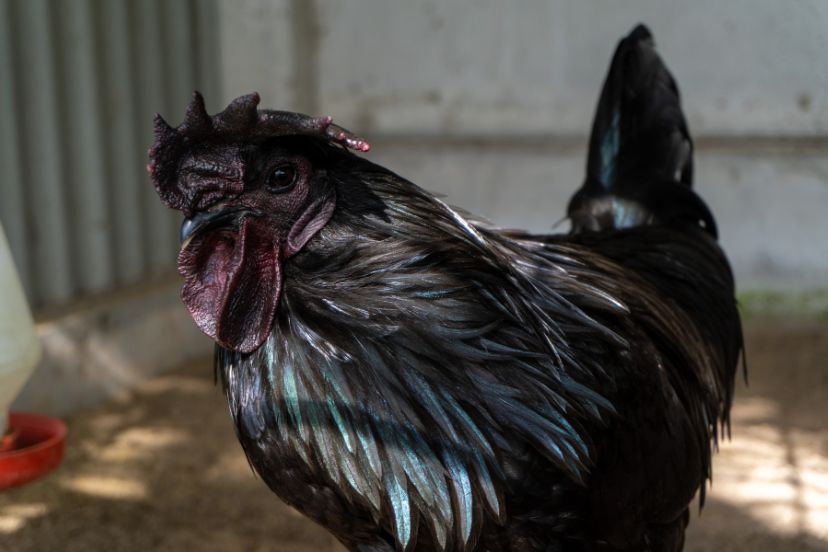
This is the crown jewel among black chickens. Hailing from Indonesia, the Ayam Cemani is famous for its intense black coloration. Their meat, too, is black, making them a hot topic among poultry enthusiasts.
Silkie
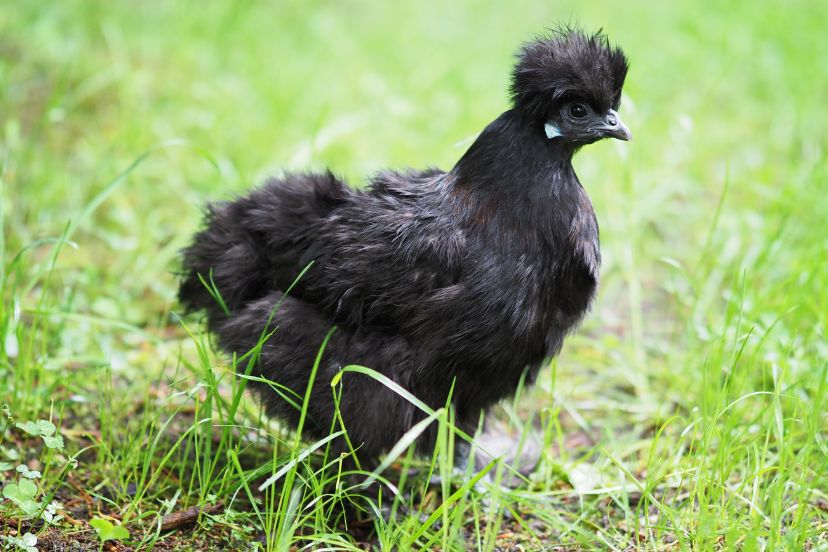
Soft, fluffy, and looking like a cute cotton ball, the Black Silkie is more than just its looks. It’s cherished for its sweet temperament and is a favorite among backyard poultry keepers.
Cochin
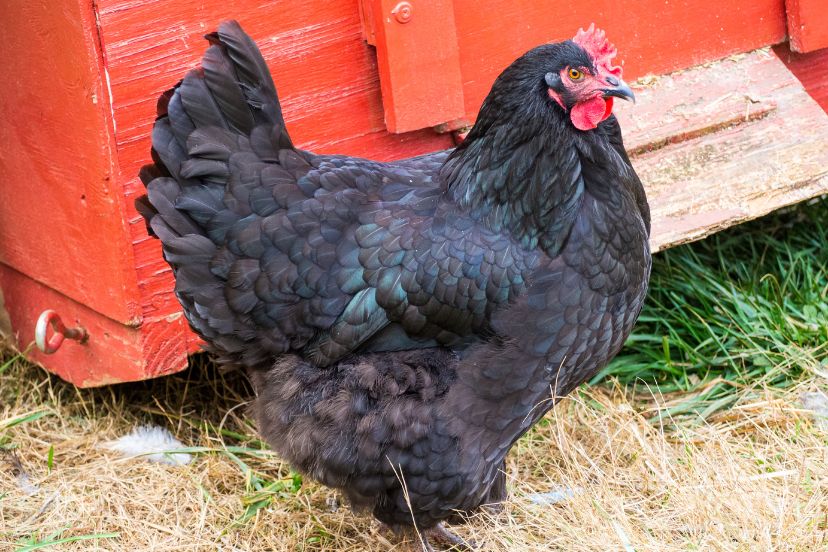
Originating from the 1840s and beloved by Queen Victoria, which boosted their popularity during the Victorian era, Cochins have transformed over time. Initially taller and less fluffy, they underwent crossbreeding to become the feathery bundles we know today. Primarily buff-colored but also found in birchen, these chickens are known for their cuddly nature, suitable for both children and adults, and come in both standard and bantam sizes.
Orpington
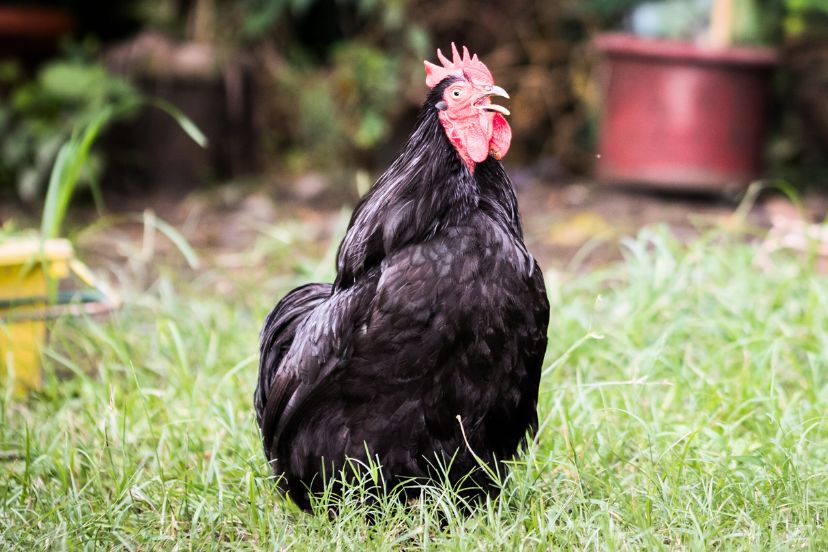
Originating as black to blend with the 1800s’ soot, Orpingtons became favored for their egg-laying and meat. Typical of English farm chickens, they’re calm but active during feeding. Producing 4-5 large eggs weekly, their docility, particularly when accustomed to handling, makes them child-friendly and suitable for quiet urban settings.
Langshan
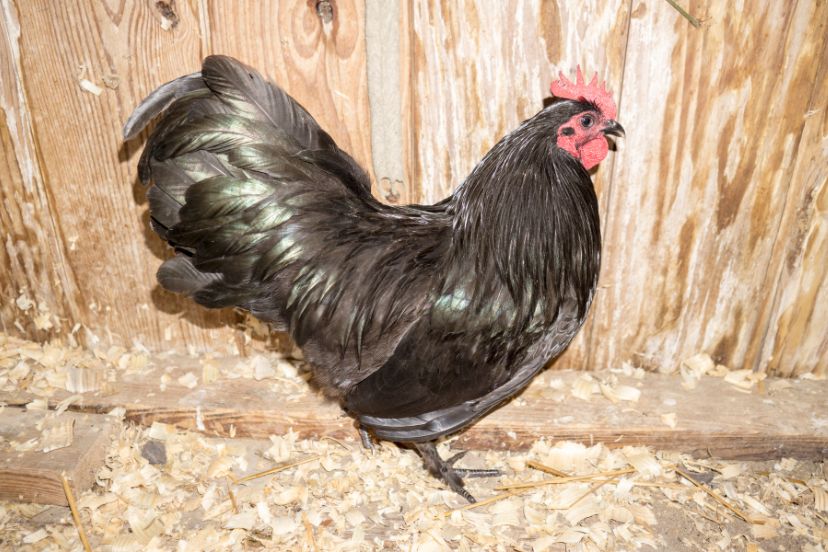
Firstly called Croad Langshans after Major Croad’s 1800s introduction to England, the breed now has four variations: Croad, Modern, Australian, and German. All are black, with Croad Langshans commonly found in the UK and US. Their differences stem from specific breed standards. Though gentle, they’re not particularly cuddly.
Brahma
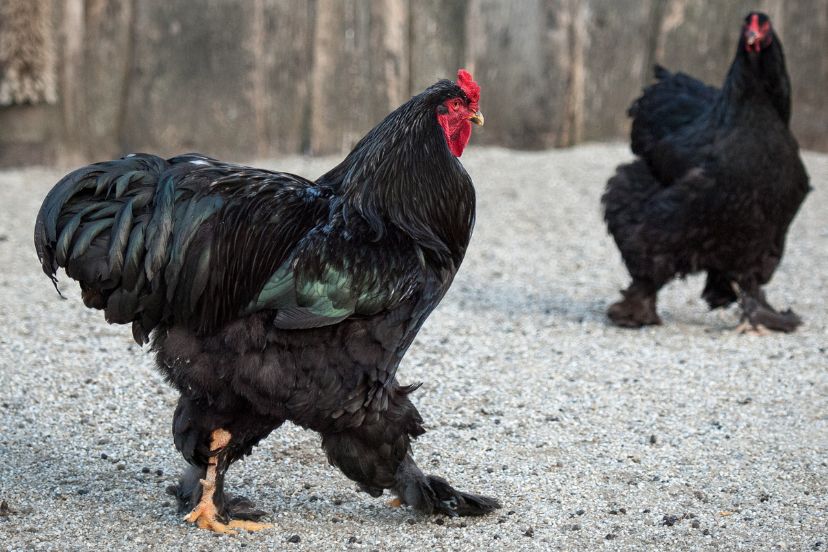
Black Brahma Chickens, known for their distinct black feathers, are robust farm birds that excel both as egg layers and meat providers. Calm and hefty, they’re especially gentle when raised with human interaction, making them beloved by families. Their quiet nature also suits suburban or city coops.
Read our article 5 Facts About Dark Brahma Chickens for more information.
Jersey Giant
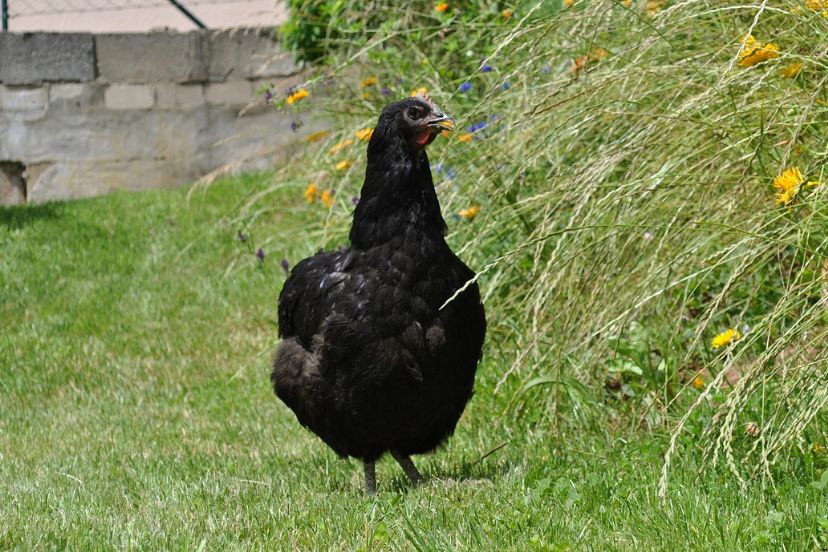
From New Jersey, Jersey Giants were intended to rival turkeys and, while not initially popular, have become favored backyard chickens, especially in black. Known for their calm demeanor, they’re suitable for urban settings, laying 3 extra-large eggs weekly and thriving in cooler climates.
Australorp
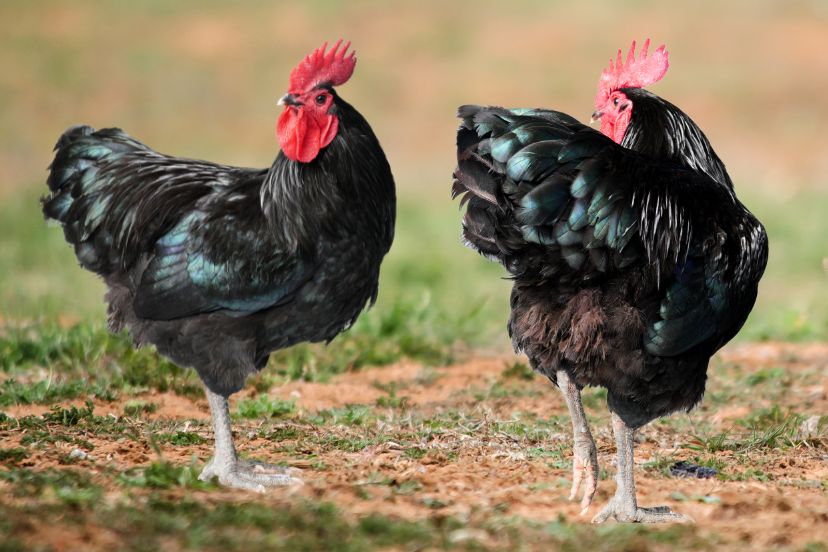
Introduced to Australia from the UK in the 1800s, Orpingtons led to the creation of the more prolific egg-laying Australorp, primarily recognized in black. While initially reserved, these chickens have friendly personalities, are quiet, making them neighbor-friendly, and produce 4-5 eggs weekly.
Black Sumatra
With shimmering feathers and a spirited personality, the Black Sumatra is an attention-grabber. Their long, flowing tail feathers can make anyone’s heart flutter! From Indonesian islands like Java, Borneo, and Sumatra, where they still thrive, the Sumatra chicken in the US is primarily ornamental. Males boast long, elegant tails and a majestic presence, while females are smaller without such tails; however, their temperament leans more towards game birds and they aren’t particularly sociable.
Java
The Java, America’s second oldest breed, originated from Far Eastern chickens. Once widespread on farms, its slower growth made it less favored in the industrial poultry world. Yet, it’s ideal for homesteads, being a good forager and laying 3 large brown eggs weekly. With black or black and white feathers that gleam green in sunlight, this calm, docile hen is perfect for backyards and requires conservation efforts.
Caring for Black Chickens
Feeding black chickens isn’t just about providing them grains; it’s about ensuring they get the best. A balanced diet with the right amount of protein and essential nutrients is crucial. And speaking of treats, who wouldn’t love some wriggly worms or crunchy grains occasionally? These delicacies not only satisfy their taste buds but also contribute to their overall well-being.
When it comes to housing, black chickens deserve the best. Think of a coop as their personal castle – it needs to be roomy, airy, and, most importantly, safe from those pesky predators. Remember, the key to their longevity and productivity lies in their comfort and happiness. A cozy and secure environment keeps those clucks and crows going!
Health is wealth, even for our feathery friends. Regular health checks can prevent potential issues and ensure your black chickens remain in tip-top shape. Whether it’s a limp, a lackluster feather, or an unusual behavior, staying vigilant can be the difference between a minor hiccup and a major health concern. And don’t forget those tiny parasites – they can be sneaky!
Fun Facts about Black Chickens
The Mystical Blue-Tinted Eggs
Imagine finding a nest filled with striking blue-tinted eggs! It might sound straight out of a fairy tale, but certain black chicken breeds can indeed lay these azure gems. These eggs aren’t just a visual treat but are also believed by some to have superior taste and nutritional qualities.
Nature’s Sunscreen – The Black Hue
Mother Nature is indeed wondrous. The deep black hue of these chickens is not merely for show; it serves a functional purpose too! This dark pigmentation provides an extra layer of protection against the sun, acting as a natural sunscreen. This means black chickens can comfortably forage under the sun without getting easily sunburned. It’s like wearing a built-in sun hat!
A World of Wonders and Whimsy
The realm of black chickens is truly fascinating, brimming with peculiarities and awe-inspiring facts. From their unique egg colors to their natural protective mechanisms, they are a testament to nature’s endless creativity and adaptability. Who knew poultry could be so perplexing and intriguing?
FAQs
Are black chickens hard to care for? No, they’re similar to other breeds but always read up on specific care guidelines for each breed.
Can I keep different black chicken breeds together? Yes, but always monitor them initially to ensure they get along well.
Is black chicken meat safe to eat? Absolutely! It’s not only safe but also rich in flavor and nutrition.
Why are Ayam Cemani so expensive? Their rare genetics and unique appearance contribute to their higher price.
Do all black chickens have black meat? No, but breeds like Ayam Cemani do have this characteristic.




